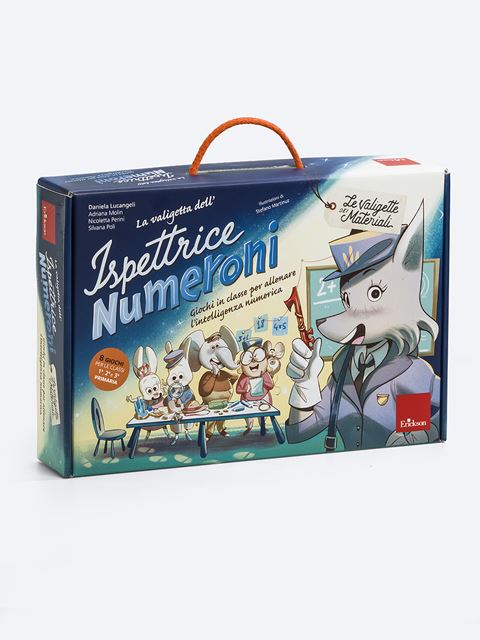 EN
EN
 PT
PT
Classroom games for practicing numerical intelligence

Product: Teaching tools
ISBN: 9788859023487
Publication date: 01/09/2020
Suitable for: Primary 1st level (ages 6-7), Primary 2nd level (ages 8-10)
REQUEST A SAMPLE OR MORE INFORMATION
Inspector Numbers’ Briefcase, created by Professor Daniela Lucangeli and her research group at the University of Padua, proposes 8 board games which support mathematical learning and practice numerical intelligence in children during the first three years of primary school.
Learning through play is definitely a winning choice. Starting from this simple reality, Inspector Numbers’ Briefcase involves the whole class, divided into small groups, in a series of exciting and fun games, capable of supporting the learning of mathematics in an innovative way.
During the game, the children play the role of Inspector Numbers’ helpers, while the teacher is Inspector Numbers, the main character of the series Numeric intelligence mini mysteries, and will have the role of leading the investigation. The children will thus be able to participate in a police investigation, and will have to work together to find the hints and clues that will help them solve the riddle. At the same time, the teacher will be able to integrate the teaching of mathematics using non-traditional practices.
Learning objectives
The game, organized into three levels of difficulty, for a total of 24 different games, aim to reach the typical objectives regarding learning mathematics:
The poster
A poster displaying all the suspects is included in the Briefcase: the teacher can hang it in class while carrying out the activities.
Box contents:

Classroom games for training numerical intelligence

A briefcase to learn math with 8 fun board games designed for children in 1st, 2nd and 3rd grades of primary school!
Eight games designed to be played simultaneously by the whole class divided into small groups and characterized by a narrative context in which the children will be the protagonists of the entertaining investigations of Inspector Numbers: the outcome of each game will help to uncover a clue to find the culprit and solve a mysterious riddle!
CONTENTS
Inspector Number’s briefcase includes:
 AN ACTIVITY GUIDE
AN ACTIVITY GUIDE
 6 DECKS OF CARDS
6 DECKS OF CARDS
 6 DICE and 4 PAWNS
6 DICE and 4 PAWNS
 164 TOKENS
164 TOKENS
 1 GAMEBOARD
1 GAMEBOARD
 A POSTER OF SUSPECTS TO HANG IN CLASS
A POSTER OF SUSPECTS TO HANG IN CLASS
OBJECTIVES
The games contained in Inspector Numbers’ briefcase are intended to integrate the didactics of mathematics teaching with non-traditional practices. In fact, they offer children an experiential basis to express mathematical skills acquired in class and to learn others in a playful and engaging way. Furthermore, the narrative context in which the games are inserted favors communication and cooperation between classmates who must try to solve the mysterious cases together.
MATHEMATICAL SKILLS
The games - divided into three levels of difficulty (level 1, level 2, level 3) - are designed for the development, training and consolidation of the following mathematical skills:
Leaf through a few pages of the Activity Guide which have been translated into English to facilitate your evaluation of the product:
NUMERIC INTELLIGENCE MINI MYSTERIES
Inspector Number is also the main character of the Numeric Intelligence Mini Mysteries: a series of fun activity books to train numerical intelligence in primary school!
THE AUTHORS
Daniela Lucangeli is a Professor of Developmental Psychology, Vice Rector of the University of Padua, President of the National Association for Specialized Teachers (CNIS), and a Member of the International Academy for Research in Learning Disabilities (IARLD).
Adriana Molin is a psychologist specializing in life cycle psychology and an expert in learning psychopathology.
Nicoletta Perini is a psychologist specialized in learning psychopathology and psychological testing, and is a lecturer at the School of Specialization in Life Cycle Psychology at the University of Padua.
Silvana Poli is a psychologist, an expert in learning difficulties, and a lecturer at the School of Specialization in Life Cycle Psychology at the University of Padua.